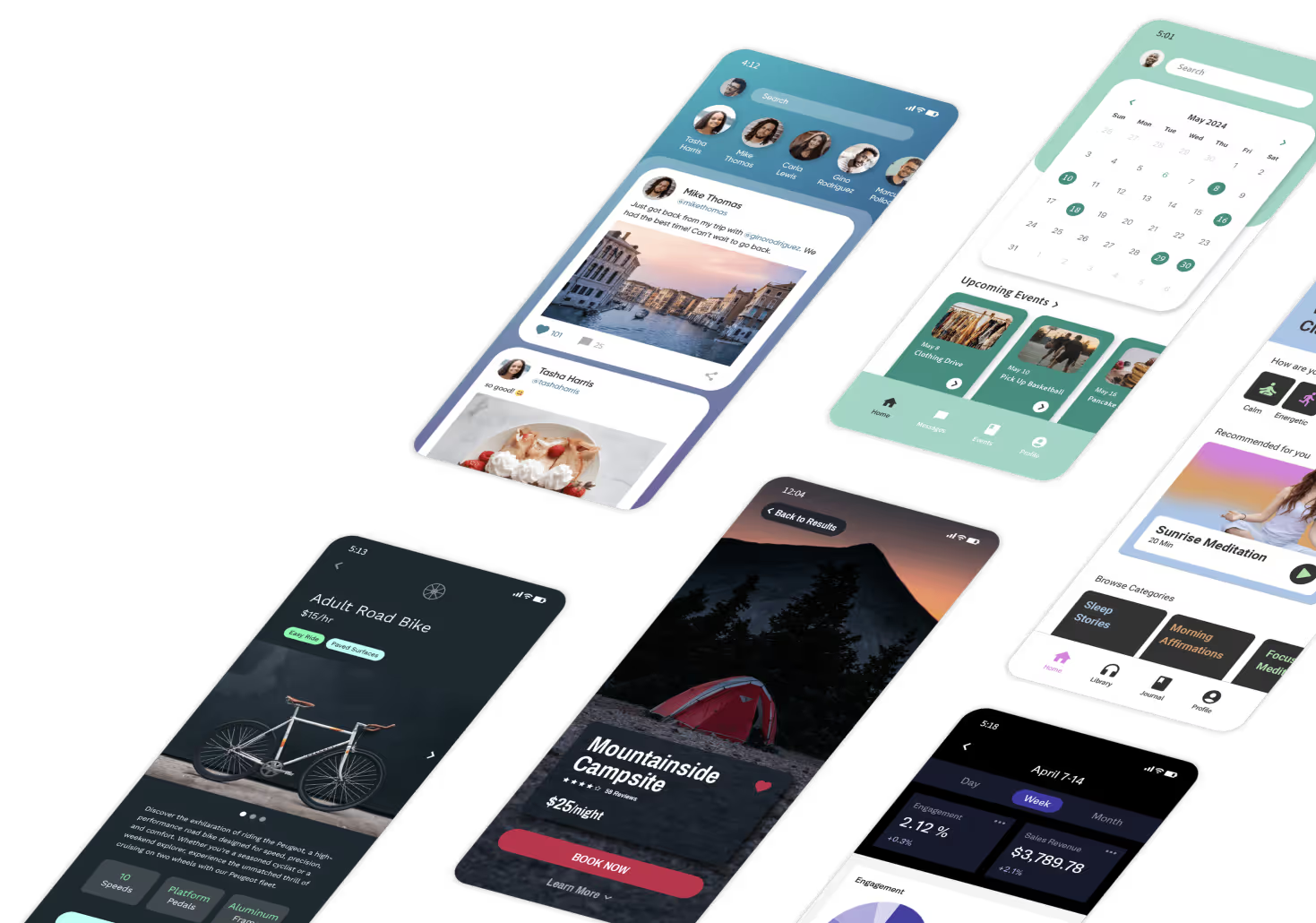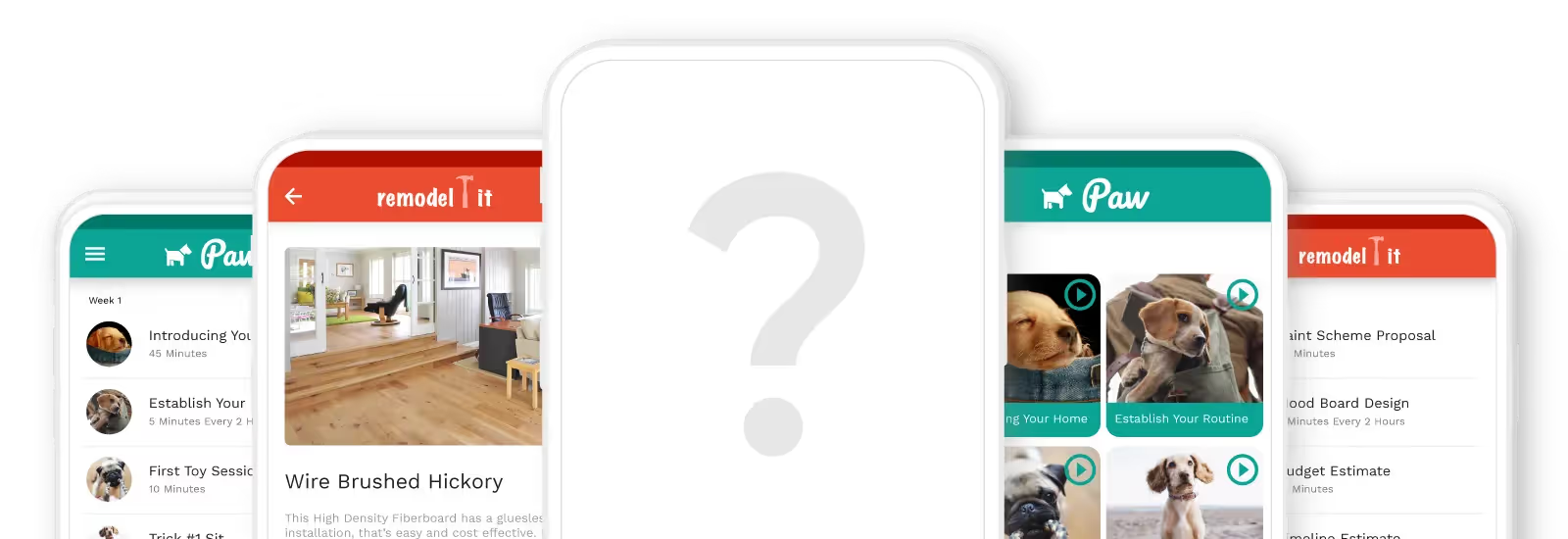Imagine having a uniquely branded fitness app that lets you communicate with clients, schedule appointments, track gains, and more.
Does this sound like a dream? Thanks to the latest fitness app builders, it’s now a reality.
These no-code platforms offer a seamless way for trainers, gym owners, and fitness enthusiasts to create a customized app without any technical headaches.
In this article, I’ll discuss the 5 best fitness app builders of 2024 so you can easily find the best fit for your project.
Here are the 5 best fitness app builders:

What Is a No-Code Fitness App Builder?
Indeed, fitness apps can differ greatly. Gyms and personal trainers use some to execute a myriad of tasks, while others may be used by trainers just starting and looking for a simple scheduler.
Ultimately, you can use a fitness app builder to create a fitness app that meets your needs. However, all fitness app builders must have the following features:
- Zero tech skills required: To use the fitness app builders on my list, you won’t need to know any technical knowledge, coding language, or programming logic. To add features, simply drag them to the center of your screen using your finger or cursor, and you’re all set.
- Premade, modern-looking templates: You can use a template to create your fitness app. A legit fitness app builder comes with a fitness template that catches attention and radiates style. You’ll be able to customize each template and transform it into a one-of-a-kind fitness app.
- Thriving ecosystem: Want to learn every little functionality your app builder features? Great, because a high-quality fitness app builder comes with an ecosystem full of tutorials, video explanations, help guides, and a forum where you can ask questions and connect with other folks creating their fitness apps.
How I Picked My Top 5 Fitness App Builders
I took into account the unique fitness and workout-related jobs that fitness apps accomplish. So, when we narrowed down my list of fitness app builders, I ensured that each one included these functionalities that are crucial for creating a kickass fitness app:
- Scheduling and booking features: Most people building a fitness app will want to have a function that allows them to plan workouts and take bookings. Taking bookings through an app and having scheduling in one place makes organization easy, enabling you to free up time for more clients and reduce no-shows.
- Messaging: Instead of fumbling through your personal text messages, Facebook Messenger, or WhatsApp, you’ll be able to add a messaging feature right into your app. A messaging system will contribute to fluid client communication while bolstering your professional reputation.
- Zapier integration: Zapier is a third-party software system that allows you to integrate your app with thousands of other accounts. When you integrate with another account, you can download specific data from it to your app.
For instance, you can use a Zapier integration to get heart-rate data from your Strava account, log workouts via MapMyFitness, and more.
#1 Adalo: The Best Overall Fitness App Builder

Adalo is an insanely flexible app-building platform that allows you to customize your fitness app fully.
Why Do I Like It?
Here’s why Adalo is the best overall fitness app builder on this list: It’s easy enough to start building your app immediately after creating an account yet powerful enough to customize it to your exact tastes and brand.
Adalo’s fitness template comes loaded with all the pieces you need to start building without any fuss. You’ll find fitness app screens (your app pages), pre-made logic (this is how your app thinks and executes tasks), and a database (your app’s storage center). You can reconfigure each piece to your liking.
Who Is It Best For?
Whether you’re a seasoned personal trainer, a new one just launching your career, or a gym owner with a loyal clientele and large staff, Adalo can help you bring your fitness app idea to life.
Pricing
Start building your fitness app for $36/month.
Features
- One of the cool things about Adalo is that it lets you publish your app to the Apple App Store and Google Play Store. This makes it simple for clients to download your app directly to their phones.
- Send push notifications to clients to remind them of an upcoming appointment or inform them of special deals so everyone makes it to class on time.
- Make it easy to collect payments through Adalo’s Stripe integration — you can allow clients to pay for a bulk number of classes right from your app to save time and prevent headaches.
#2 Bubble: The Fitness App Builder with the Biggest Ecosystem

Bubble is one of the most popular and flexible web app builders, with a staggering number of resources and tools.
Why Do I Like It?
While Bubble does require that you master a learning curve, doing so will open the floodgates to provide an endless torrent of power. Bubble’s been around since 2012, and folks have made over 3 million apps using the platform. You’ll have all the support and tools you need to create a fitness app that’s powerful.
Who Is It Best For?
Bubble is scalable enough to create a web app to accommodate any number of users — from a few clients to 1,000s of gym members. However, you’ll need to take some time to learn the platform, and you won’t be able to publish your app on the Apple App Store or Google Play Store.
Pricing
After familiarizing yourself with Bubble by trying its free version, start using Bubble for only $32/month (billed monthly) and get white-label branding and a powerful suite of SEO features so folks can find your app on the web.
If you’re building an app with a partner, try the $134/month (billed monthly) version. It allows up to 2 app editors and 2-factor authentication to keep your app extra secure.
Features
- Bubble has no shortage of templates, with over 1000 free and paid ones, including 3 different fitness templates for building your app.
- You’ll also have access to 1,000s of add-ons and plugins that can boost your app’s functionality. For instance, integrate with the Google Fit API and get access to steps, calories burned, distance covered, and even glucose levels.
#3 TrueCoach: A Classic Fitness App Builder

TrueCoach is a fitness app builder that allows you to create specialized workouts for your clients.
Why Do I Like It?
Although it’s not as customizable as a traditional no-code app-building platform, TrueCoach is a battle-tested fitness app platform that has been around since 2015. It boasts tons of fitness-centric features, like a workout builder, an enormous video library with dozens of workout technique demonstrations, and in-app messaging.
Who Is It Best For?
TrueCoach has plans for everyone. From start-up trainers to lifelong coaches with a thick client portfolio. Although you won’t have the design freedom to craft your app to your needs, TrueCoach is a great one-stop shop for anyone needing a basic fitness app.
Pricing
Although TrueCoach doesn’t have a free version, take it for a test driving using its 14-day free trial. For $29.98/month (billed monthly), you’ll be able to get up to 5 clients and the in-app messaging feature. If you have more clients, go for the $69.98/month (billed monthly) version, which allows up to 20 clients and provides direct integrations with wearables, like heart rate monitors and more.
Features
- Share videos from TrueCoach's vast video library, which features over 1,000 fitness videos, to inspire your clients to keep practicing new techniques.
- Set up easy, recurring payments with TrueCoach’s automated billing feature so your clients never forget to pay for your hard work.
#4 Movement: A Newer Fitness App Builder for Personal Trainers

Movement is a no-code, drag-and-drop app-building platform that’s specifically designed to meet the needs of folks building fitness apps.
Why Do I Like It?
Movement serves one crowd only: People who want to create fitness apps. It comes with a collection of 10 (and growing) fitness-specific templates that you can tailor to your fitness brand.
If you don’t have time to build your fitness app, Movement can do it for you. You’ll have to contact the team and let them know what kind of fitness app you want.
Who Is It Best For?
Movement has a template for anyone in the fitness industry — from yoga teachers to die-hard crossfitters. It’s also a good choice for those who want their fitness app but don’t have the time to create it themselves.
Pricing
After trying Movement’s free version, jump on its $49/month (billed monthly) version to get unlimited video uploads and only a 2.5% transaction fee. For $99/month, you’ll get your white-label branding and the vaunted Zapier integration.
Features
- If none of the templates mesh with your fitness app idea, Movement is willing to work with you! They’ll let you fill out a template request form describing what you want in a template and work on getting it built.
- Movement allows for an unlimited number of video and audio uploads. You can film your students executing a technique while you coach them and then upload that video to the app so they can practice at home.
#5 Everfit: An Easy Fitness App Builder for Trainers on the Go

Everfit is an all-in-one fitness app builder that allows you to customize your training platform.
Why Do I Like It?
While not a standalone app builder like Adalo, Bubble, or Movement, Everfit comes with a comprehensive suite of fitness features like a customized workout builder and automated scheduling.
These allow you to craft your own workout and training programs to cater to almost any audience.
Who Is It Best For?
If you’re looking for a simple fitness app builder that lets you customize workouts for each client fast, try Everfit. You’ll be able to custom-make a diverse number of workouts in no time.
Pricing
You can start with up to 5 clients on the free version, and then, for $19/month (billed monthly), you’ll pay an additional monthly rate of $3.80 per client for your next 5 and $2.90 per client for your next 10. You’ll also get white-label branding.
If you have 50 clients or more, try the $109/month (billed monthly) version and pay an additional monthly $2.10 per client. You’ll also get a group chat function and the ability to upload your unique exercises.
Features
- Use Everfit’s AI feature to organize weight-lifting routines, design interval training, or build new workout plans from a simple prompt.
- If you run a team of trainers, use the automation feature to delegate tasks to each member of your team.
Frequently Asked Questions
How Do I Choose the Best Fitness App Builder?
One of the first things most people consider is a fitness app builder’s pricing and the benefits they’ll get. While Everfit and TrueCoach are the cheapest, both under $30/month, they’re not very customizable fitness app builders, providing very little design freedom.
This means you won’t be able to use these two platforms to customize your app to your tastes, and you’ll have to accept many “fixed” features, like layouts, button placements, and more.
Adalo, Bubble, and Movement start at $36/month, $32/month, and $49/month, but you’ll have the power to create a very customizable app, as you’ll be able to move forms around, insert new pictures, change up text, and more.
How Much Does It Cost to Develop a Fitness App?
Hiring a freelance developer or agency to develop a fitness app with coding is very expensive — starting at $6,000 and reaching almost $100,000. App development costs depend on the app’s number of features and scalability.
I highly recommend that you take advantage of a no-code fitness app builder, which is a fraction of the cost developers will charge.
What Are Some Features I'll Need for My Fitness App?
Two bare-bones functions all fitness apps must have are booking and scheduling features. This way, your clients can see when you’re available and book classes, and you’ll be able to see all your scheduled classes in one place.
Ideally, you should also be able to take payments with a Stripe or PayPal integration for fast payments and a messaging feature to contact your clients in one easy-to-find place.
Some of the best fitness apps will allow your clients to create their profiles (like social media) so all their workout data is convenient and accessible. A Zapier integration is also an important feature, as it allows you to transfer data from external fitness accounts, like Strava or FitBudd.
How Much Time Does Making a Fitness App Take?
The time it takes to build your fitness app depends on the fitness app builder you select and the amount of time you put in daily. While you’ll be able to get your fitness app up and running with a simple app-builder like TrueCoach and Everfit, your app will lack unique, customizable features.
When choosing between Adalo, Bubble, and Movement, Bubble is the most difficult to learn, taking a few months to master.
You’ll most likely find that Adalo is the easiest to learn and gives you plenty of power. Movement will have a good selection of workout-related features but not as much app-building power as Adalo.
Build Your Next Fitness App with Adalo
In the competitive fitness industry, having a dynamic app that evolves with your client's needs is essential.
Adalo is a fitness app builder that empowers you to create native mobile and web apps without writing a single line of code.
With Adalo, features like exercise tracking and client management are built-in. At the same time, more custom options, such as nutrition plans or progress photo galleries, can be effortlessly added with a simple drag-and-drop.
To stay ahead in the competitive fitness industry, it's crucial to adapt quickly to your users' evolving needs. With Adalo's intuitive interface, you can implement new features and updates in a matter of minutes or hours, ensuring your app always meets user expectations before they consider switching to a competitor.
Ready to take your business to the next level?














